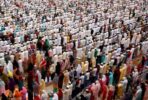Dr Tommy Koh has revealed that the poverty rate in Singapore can be as high as 33 percent in Singapore and 60 percent of university students come from families which cannot earn enough to survive.
“I am disturbed by the inequality in Singapore,” Dr Koh wrote in an opinion piece in The Straits Times on Jan 3.
“We have one of the highest Gini coefficients in the world. I am unhappy that many of our children are growing up in poverty. About a third of our students go to school with no pocket money to buy lunch.”
Indeed, the poverty rate in Singapore has been estimated to be as high as 30 percent. National University of Singapore economist Tilak Abeysinghe has also calculated that 30 percent of Singaporeans cannot earn enough and have to spend 105 percent to 151 percent of their incomes.
“As a trustee of two education trusts, I am reminded each year of the large number of needy students in our schools and tertiary institutions. I was shocked when the president of one of our universities told us recently that 60 per cent of his students need financial assistance,” Dr Koh also said.
Indeed, a Straits Times survey had shown that two-thirds of middle-income households in Singapore are able to earn enough only to spend on basic necessities and nothing else.
“At the other end of the spectrum, I am worried about the growing number of the elderly poor. Many of them are in poor health and have inadequate savings. Many of them live in loneliness, having no family or been abandoned by family and relatives,” he said.
It is indeed the case that over the past few years, there have been a growing number of stories of how older Singaporeans have chosen to die because they cannot afford their medical fees.
What Dr Koh say is not new but it is the first admission from someone who is close to the establishment to have detailed these facts.
Today, Singapore has risen to become the most expensive country and city in the world.
But Singaporeans still continue to earn one of the lowest wages among the developed countries in the world. In fact, there is still no minimum wage in Singapore – one of only 10 percent of countries in the world not to have one.
In 2012, Dr Koh also wrote in an article comparing the GDP per capita of Singapore with the Nordic countries. Singapore’s GDP per capita was on par with the Nordic countries, but wages are drastically different.
Dr Koh revealed that cleaners in Singapore would only earn $800 when cleaners in the Nordic countries would earn between $2,085 to $5,502, or several times more.
However, because Singaporeans also have to pay for the highest cost of living in the world, this has also meant that Singaporeans have the lowest purchasing power among the developed countries.
Dr Koh had then also written, “The truth is that we pay these workers such low wages not primarily because their productivity is inherently low, but largely because they are competing against an unlimited supply of cheap foreign workers.
“The solution is for the State to reduce the supply of cheap foreign workers or introduce a minimum wage or to target specific industries, such as the hospitality industry, for wage enhancement.”
It is debatable whether the government has done so. The government has said that the basic wages of cleaners will be increased to $1,000 every month and for security guards, this will be increased to $1,100 but the new base salary will only take effect in 2016 for the latter.
However, critics argue that $1,000 or $1,100 is still insufficient when Singaporeans have estimated that a minimum wage of $1,700 or more would be necessary to have the most basic of living in Singapore.
Source: www.therealsingapore.com







